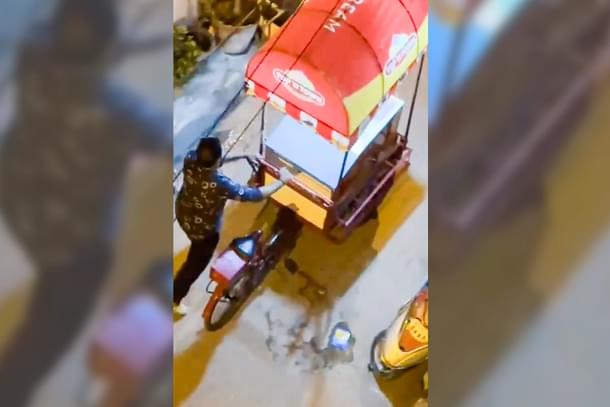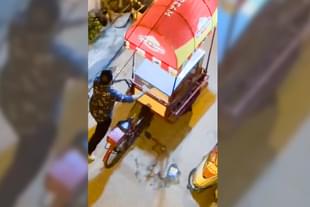Society
Video Leads To Arrest Of Ice-Cream Seller Who Groped Minor Girl, Police Also Arrest Video Creator
Swati Goel Sharma
Jul 11, 2024, 02:36 PM | Updated 02:36 PM IST
Save & read from anywhere!
Bookmark stories for easy access on any device or the Swarajya app.


Two weeks ago, in a quiet neighbourhood of Bhopal, Ramesh Sahu, a local resident, stood on his balcony when he witnessed a vendor groping a young girl buying ice cream from him.
Horrified by what he saw, Sahu recorded the incident on his mobile phone. The video, distressing and graphic, shows the girl’s desperate attempts to escape before she eventually breaks free, while the vendor watches her leave and then calmly moves his cart away.
Ramesh shared this video on WhatsApp, and it quickly circulated in the area. The video reached the girl’s mother, who recognised her daughter through her clothes and the partial visibility of her face.
She reported the incident to the Jehangirabad police, identifying the victim as her 12-year-old daughter. She stated that the molestation occurred on the night of June 28, but she only saw the video two days later.
Using the video as evidence, the police identified the perpetrator as 52-year-old Mohammed Khalid Khan, also known as Pyaare, a migrant from Uttar Pradesh’s Jalaun district. Khan was apprehended from his native town, Kalpi, where he fled following the video's circulation.
In a surprising turn of events, the police also arrested Ramesh Sahu a few days later, charging him under the Protection of Children from Sexual Offences (POCSO) Act.
The charge against him was that he circulated the video on social media, thereby revealing the identity of the young girl, instead of reporting the incident privately to the police.
Sahu's arrest under the POCSO Act has evoked strong reactions on social media, with many users criticising the police’s move.
What do POCSO norms say?
It is pertinent to mention that revealing the identity of minor victims who have been subjected to abuse is indeed a violation of POCSO provisions.
Section 23 (2) of the POCSO Act prohibits the media from disclosing the identity of a child in any form of reporting, including on social media, to protect the privacy and dignity of the child. While Ramesh is not part of the media, the same principles apply to individuals in terms of not sharing identifying information of victims.
Section 21 of the act mandates that any person who has information regarding an offense under this act is obligated to report it to the police.
So, while Sahu's intent was likely to raise awareness and ensure that the perpetrator was caught, which he successfully achieved, the impact of his actions might have been detrimental to the victim. Exposing a victim's identity can potentially subject them to further trauma and social stigma.
Responsibilities of bystanders
As pointed out by several social media users, Ramesh took an important step in documenting a crime.
As a user wrote on X, "Revealing identity of the minor was totally unintentional in this case. People who report a crime shouldn't be targeted if no malafide intention."
Another user wrote, "We must run a campaign for Ramesh. Else, no one is going to keep vigil and report."
Another user said, "Ramesh should be warned only."
Author Shefali Vaidya wrote, "This is a travesty of justice. If the video was not recorded, Pyare Khan would NEVER be arrested!"
On the other hand, police say that in such incidents, there is a significant ethical responsibility to protect the victim’s privacy. The proper channel for reporting the incident should have been directly informing the police or child protection services, as emphasised by a police officer to Swarajya.
While the police might have aimed to send a strong message by arresting Sahu, many users wonder if, instead of immediate arrest, a warning should have been issued to him, considering his intentions were not malicious.
Would the police have acted otherwise?
The incident also casts a spotlight on the police, revealing a troubling trend where authorities often fail to act on complaints until videos of the incidents go viral.
These videos provide indisputable proof and trigger public outrage, compelling the police to respond. For instance, in UP’s Muzaffarnagar district, a serial molester operated in ‘Jat Colony’ for three months without police intervention, despite numerous verbal and written complaints.
It was only after a resident circulated CCTV footage of a molestation incident that the culprit was arrested within a day.
Swati Goel Sharma is a senior editor at Swarajya. She tweets at @swati_gs.




